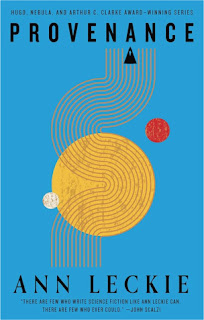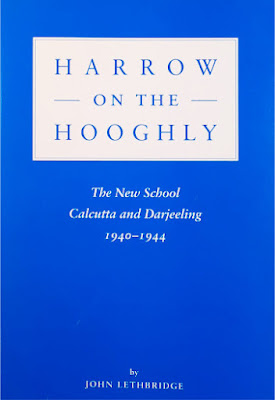Provenance is a standalone novel which appeared a little while after
Ann Leckie had made a considerable impact in science fiction with what came to be known as the
Imperial Radch trilogy. No, I don't know how to pronounce that. Perhaps a bit of Googling might turn up a fan's report of how Leckie pronounced it herself at a book signing. But it's not a bad bit of nomenclature. If it's meant to sound a bit like 'Reich', that suits the story well enough.
Provenance is set in the same universe, but outside the Radch realm, and a Radch character only appears briefly.
I'll say right out, that Provenance is a weaker book than any of those in the Trilogy; it's slighter, smaller in scale, and even seems somewhat uncertain in its intentions at times. But I'm glad I read it, because I'll be one of the many readers who found the setting intriguing and wanted to see more of it. Also, I wanted to read it before I read Translation State, set in this universe, recently published. It looks as if it has a bit more heft to it, and it's now in the waiting to be read pile.
It may seem odd that I should be spending time on reflecting on a book which has obviously made only moderate impact on me. But I feel like acknowledging that those earlier books were incidentally important in my reading life. The thing is, my reading habit fell off a cliff round about the millenium. I suppose there were three general influences. The first involved a lot of personal changes - family events including a couple of house clearances, and then a major house move myself. The second was naturally connected, involving a prolonged low state of mind. Over all, the thing which has changed the world, the arrival of the internet. Not that it wasn't already here - I think I was sending the odd email and accessing news groups ten/twenty years earlier. But it took adsl technology and smartphones for the world wide web to become accessible for everyone. Really, I was reading a lot: web pages, magazines (their last hurrah) etc.
But not books?... It's hard to explain. Except for the simple point that reading is a habit that takes some effort; it certainly isn't passive entertainment. My reading log for those years, 2002-2017, displays several blank pages, and others with only one or two books listed. In reality, I'd slipped into a deadly habit, not of reading properly, but of skimming. After reading the first Hunger Games book, I skimmed the others. I'm afraid I found that all too easy; I sort of liked the story but only wanted to know what happened. The worst example came about when I spotted The Girl With the Dragon Tattoo - unknown to me at the time ie I was ignorant of any hype - and was gobsmacked by the page turning skills of the author. Trouble is, it was so immersive that I read it through the night, the other two volumes as well, unable to put them down, but impatience and tiredness inevitably led me to skip sections.

So. In 2014 one witnesses the first seed of a New Hope. To coin a phrase. That year I read Ann Leckie's
Ancillary Justice. I hadn't bothered much with science fiction for so long, but I knew the standard of writing there had improved - roughly along with more and more women writers writing it, to be frank. Leckie's book was thoroughly engaging with its fascinating protagonist and premise, its generally well fleshed out world building, and I found and read the rest of the Radch trilogy as soon as I could. The experience triggered my desire to follow up other neglected goals, ie books by other past favourite authors. By 2018 and from then on I've been reading 20-30+ books a year. Ann Leckie's work isn't the sole reason for the return of my reading habit, but my reading record does suggest those books of hers had a lot to do with it.
Things are rarely original in SF, but the ideas Leckie played around with in the Ancillary books seemed striking and provocative, especially regarding identity. Most readers focused on a perceived difficulty in following the story when only one pronoun was used, plaintively asking how one was supposed to know if someone was male or female. It took some adjustment for me too, but not as much, simply because I'd been studying Finnish for a while. We're very parochial in the English speaking world; the reality is that there are any number of languages like Finnish which don't distinguish gender in their pronouns. You get used to it! It's not a problem! (Except, still, for Google Translate)
I'm afraid my memory of the story from ten years ago is a little faded, though I can certainly recall what was for me a much more interesting theme of identity. Ancillary Justice's protagonist is a human avatar of the AI which is the ship of the title. Whether it was the writing, or the way my imagination got to work on this scenario I'm not sure, but I remember finding this both fascinating and disturbing, on a quite visceral level. And things take on a whole new character when the ship is destroyed, leaving the ancillary alive and alone. So much follows... and just wait until you encounter the ruling intelligence of the Radch realm. I'm sure the Trilogy will be seen, if it isn't already, as a milestone in science fiction history.
Finally, I found my motivation to read properly again. Now I wanted to chase down various 'loose ends' in my reading, ie other books by favourite authors (Keith Waterhouse!), certain unfinished books (Moby Dick!), and writers I'd known would be significant to me but I hadn't yet ventured towards back in the old days (Saint-Exupéry!). Furthermore, some of my reading would definitely be science fiction. More than anything else, I wanted to continue and finish all Gene Wolfe's 'Solar Cycle' books. I was not disappointed, they were a remarkable literary achievement. And almost at that rarified level, Iain M. Banks' Culture books.
And, though maybe not quite so monumental, I would read any Radch-related books Ann Leckie wrote.
Which brought me to Provenance, and, before too long, Translation State.
In the earlier trilogy, there are references to other peoples beyond the Radch Empire. In Provenance, the setting is one of these: still human, but with a rather different society. The Radch looms somewhat distantly, while their main threats come from more local rival worlds, intent on seizing the vital gateways for interstellar travel. Our main character is Ingray, adopted daughter of an elite family intent on impressing her mother. This does seem a little mundane, doesn't it? Ingray's society features three genders, with concomitant pronouns to try and wrap our reading muscles around. This doesn't provoke the questions it might, in fact I rather like the way this is treated as matter of fact, ie it's just the way it is. It is one of Ann Leckie's qualities as a writer that she manages to gently lead us into thinking about different societies etc without too much agenda hammering. After all the story is always the most important thing.
Actually, we do get a look at one of the mysterious alien races referred to in the original trilogy, namely the Geck. Their description works up to a point, but I was never quite convinced. They turn out to originate in a water/liquid environment, and be more or less like giant intelligent sea cucumber-like creatures. Well, yes, but this kind of thing never really works for me, because I can't see how useful practical intelligence can evolve without opposable thumbs (so to speak) and fire. Let alone lead to space faring. Oh well, in the story one at least is sort of interesting as a personality.
The book's called Provenance because one of the book's themes is a nice one for our times, the way material things can acquire absurd economic value thanks to unhealthy fashions and obsessions. The status/value of things and people are twisted by perceived provenance. There's a lot of subliminal ideas in the book about societies and the importance of gender and status and economic systems. Leckie is quite good at opening up these topics without overtly directing our responses. But I'm maybe less impressed with the relative strength of story here. It's hard to get invested in Ingray's plans at the start; and then it seems we're being drawn into a murder mystery, but that isn't very mysterious in the event. When situations do gradually get interesting, the jeopardy just doesn't seem as urgent as it ought to be - but I admit that could just be me. And my irritation with the repeated phenomenon of Ingray's weeping under stress. Some, I'd have been fine with. But in the context of a character who's supposed to be transformed, into one willing to take charge of events, I got rather fed up with the blubbing. At least her decision at the denouement - her mother is indeed impressed - was satisfying.
So, like I said, I was happy to read Provenance. It did feel like something of a 'side quest', and somewhat treading water in its story telling; but I'll soon be reading Translation State, and that looks quite tasty. Two of the 20+ books I'll have read this year :)





Comments
Post a Comment